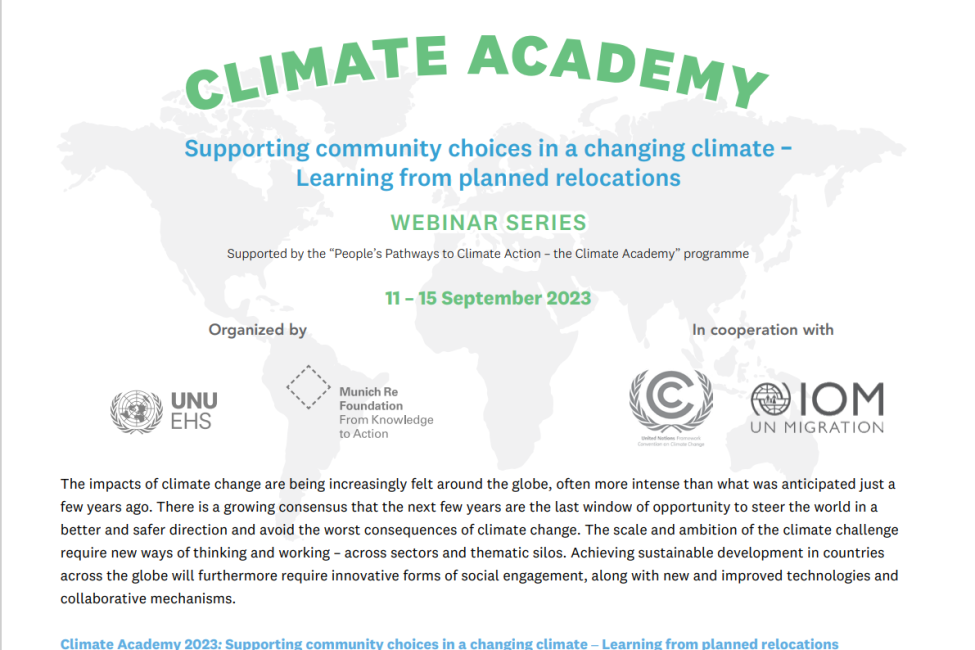-
Who We Are
WHO WE AREThe Environmental Migration Portal is a one-stop service website to promote new research, information exchange and dialogue, intended to fill the existing data, research and knowledge gaps on the migration, environment and climate change (MECC) nexus.
IOM Global
IOM Global
-
Our Work
Our WorkThe Environmental Portal aims to centralize relevant and up-to-date research, data, and information on migration, environment and climate change and
provide information on recent activities of IOM, including with its partners, in addressing the migration, environment and climate change (MECC) nexus.What we do
What we do
- Where We Work
- Data and Resources
- 2030 Agenda
Supporting community choices in a changing climate – Learning from planned relocations
-
Date
11 Sep 2023, 15:00pm
-
Location
Bonn, Germany
-
Organizer
International Organization for Migration, UNUEHS, Munich Re Foundation for Knowledge and Action, and UNFCCC
The impacts of climate change are being increasingly felt around the globe, often more intense than what was anticipated just a few years ago. There is a growing consensus that the next few years are the last window of opportunity to steer the world in a better and safer direction and avoid the worst consequences of climate change. The scale and ambition of the climate challenge require new ways of thinking and working – across sectors and thematic silos. Achieving sustainable development in countries across the globe will furthermore require innovative forms of social engagement, along with new and improved technologies and collaborative mechanisms.
Climate Academy 2023: Supporting community choices in a changing climate – Learning from planned relocations
The growing frequency and severity of negative climate change impacts have given rise to concerns about the long-term habitability of climate change “hotspots” for populations around the world. Differences in culture, circumstance, and identity condition how local communities and individuals within them perceive and respond to climate change risks and impacts, what they consider makes a place (in)habitable, and their perceptions of mobility. Research on human mobilities in the context of climate change shows that moving is but one possible response in the face of climate change risks and impacts. Many people prefer not to move, while others would have moved regardless. When people move, their movements can take many forms, of which planned relocation is just one.
United Nations University and the Munich Re Foundation in collaboration with the UN Climate Secretariat and IOM are convening the 2023 Climate Academy to bring together a diverse set of speakers to collectively explore the overarching question: “What do decision-makers in policy and communities of practice need to know about Planned Relocation to support communities in making just and timely mobility decisions related to climate change?”.
While the decision to move ultimately lies with individuals in affected communities, they are likely to require external support in implementing their decisions, whether they aim to move now, in the future, or adapt to stay. This assistance may need to come from a diversity of stakeholders, in collaboration with communities and one another. Further, this support can take various forms, including but not limited to risk expertise, legal and policy frameworks, stakeholder dialogue facilitation, technical and logistical assistance, financial resources, social and mental health support, and support in finding new livelihood opportunities. Relocation processes, when they take place with free and informed consent, also represent opportunities to correct historical inequalities in areas such as access to quality housing, exposure to environmental risks and pollution, and economic opportunity. The question of when and under which conditions relocations can occur also poses deeper political and philosophical questions about the allocation of responsibilities for implementing community decisions, about the connections of people and culture to place, about mourning and memory, and the meaning of home in a changing climate.
Spread over the week of 11-15 September, 2023, online webinars will feature succinct and policy-oriented conversations based on cutting-edge scientific research and practice. Speakers will share their perspectives from their work at and across several scales - in communities, national government agencies, and global policy-making circles. They will share their latest findings and tools, identify knowledge and implementation gaps, and highlight opportunities for collaboration between stakeholders.
EVENTS
| 2023 | Event Number | Bonn | Theme |
|---|---|---|---|
|
11 Sept Mon |
A1 | 15:00 - 16:30 | Opening event: Why talk about planned relocation? |
|
12 Sept Tue |
A2 | 11:00 - 12:30 | National perspectives on planned relocation |
|
12 Sept Tue |
A3 | 16:30-18:00 | Assessing the evidence base |
|
13 Sept Wed |
A4 | 08:30-10:00 | Decolonizing policy, practice and research on planned relocation |
|
13 Sept Wed |
A5 | 13:00-14:30 | Policies and normative principles for planned relocation: Experiences and experiments in national contexts |
|
13 Sept Wed |
A6 | 17:30-19:00 | Centering community in adaptation vs. relocation decision-making |
| 14 Sept Thu | F1 | 11:00-12:30 | «Migrations, relocalisations planifiées et recomposition territoriale face aux risques climatiques» |
| 14 Sept Thu | A7 | 13:00-14:30 | Choosing to move, choosing to stay: local experiences of risk, resistance, and support in relocation decision-making |
| 15 Sept Fri | A8 | 15:00-16:30 | After relocations: on community wellbeing, cohesion, and livelihoods |
| 15 Sept Fri | A9 | 13:00-14:30 | Closing event: How to support communities effectively – steps forward and do's and don’ts |
For further information email us at ca23@ehs.unu
